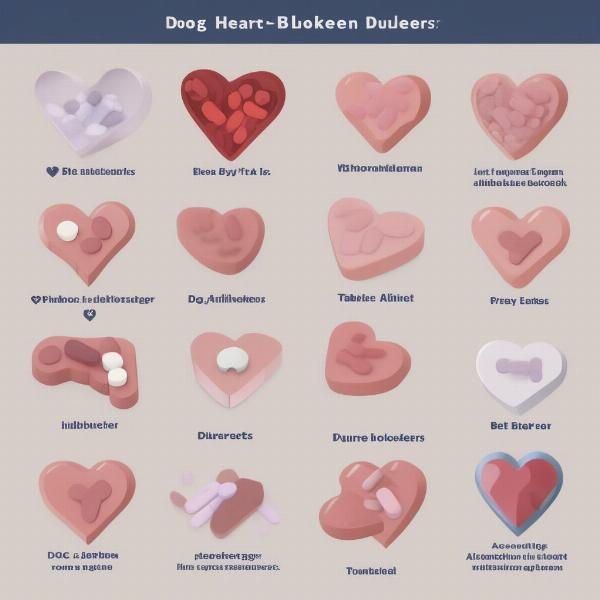Heart health is crucial for our canine companions. If you’re searching for “dog heart tablets,” you’re likely concerned about your dog’s cardiovascular well-being and seeking ways to support it. This comprehensive guide will delve into the various reasons why a dog might need heart medication, different types of heart tablets available, potential side effects, and essential considerations for administering these medications.
Heart conditions in dogs can range from mild murmurs to more serious conditions like congestive heart failure. Understanding the specific heart issue your dog faces is paramount to providing the right care and treatment. “Dog heart tablets” often refer to medications prescribed to manage heart failure, control abnormal heart rhythms, or address other cardiac-related issues.
Understanding the Need for Dog Heart Tablets
Several factors can contribute to heart problems in dogs. Breed predisposition, age, diet, and underlying health conditions can all play a role. While some heart issues might require surgical intervention, many can be managed effectively with medication. Dog heart tablets are often prescribed to improve heart function, reduce fluid buildup in the lungs, and alleviate symptoms such as coughing, shortness of breath, and fatigue.
Common Types of Dog Heart Tablets
Veterinarians typically prescribe various medications to manage heart conditions in dogs. These include:
- Pimobendan: This medication helps improve the heart’s ability to contract and pump blood effectively.
- ACE Inhibitors (e.g., enalapril, benazepril): These drugs work by widening blood vessels, making it easier for the heart to pump blood and reducing blood pressure.
- Diuretics (e.g., furosemide): Diuretics help remove excess fluid from the body, which can alleviate fluid buildup in the lungs associated with heart failure.
- Beta-Blockers (e.g., atenolol, metoprolol): These medications slow down the heart rate and reduce blood pressure, helping to regulate heart rhythm.
 Types of Dog Heart Tablets
Types of Dog Heart Tablets
Administering Dog Heart Tablets and Potential Side Effects
Giving your dog their heart medication correctly is crucial for its effectiveness. Always follow your veterinarian’s instructions precisely. Some tablets can be crushed and mixed with food, while others should be given whole. It’s important to monitor your dog for any potential side effects, which can include:
- Loss of appetite
- Vomiting
- Diarrhea
- Lethargy
- Weakness
If you notice any of these side effects, contact your veterinarian immediately. They can adjust the dosage or switch to a different medication if necessary.
Monitoring Your Dog’s Progress
Regular veterinary checkups are essential for dogs with heart conditions. Your veterinarian will monitor your dog’s progress, adjust medication as needed, and ensure the treatment plan remains effective.
Choosing the Right Heart Tablets for Your Dog
The specific type of heart tablet prescribed will depend on your dog’s individual condition, age, breed, and overall health. Your veterinarian will conduct a thorough examination, including blood tests, X-rays, and potentially an echocardiogram, to determine the best course of treatment. Never self-medicate your dog. Only a veterinarian can diagnose and prescribe the appropriate heart medication. heartworm tablets dogs
Conclusion
Dog heart tablets can significantly improve the quality of life for dogs with heart conditions. By working closely with your veterinarian, monitoring your dog’s health, and administering medication as prescribed, you can help your furry friend live a longer, healthier, and more comfortable life. Remember, early detection and proper management are key to successfully managing heart problems in dogs. heart tablets for dogs
FAQ
- What are the signs of heart problems in dogs? Common signs include coughing, difficulty breathing, lethargy, weakness, and loss of appetite.
- Can heart problems in dogs be cured? While some heart conditions can be managed effectively with medication, a complete cure might not always be possible. tablet flea treatment for dogs
- How long do dogs need to take heart tablets? The duration of treatment varies depending on the specific condition and its severity. Some dogs may require lifelong medication.
- Are there natural remedies for dog heart problems? While some natural supplements might support heart health, always consult your veterinarian before using any alternative treatments.
- Can diet affect heart health in dogs? Yes, a balanced and nutritious diet is crucial for maintaining a healthy heart in dogs. chewable tick prevention for dogs
- What should I do if my dog misses a dose of heart medication? Contact your veterinarian for guidance.
- Are there any specific breeds prone to heart problems? Yes, certain breeds like Cavalier King Charles Spaniels, Doberman Pinschers, and Boxers are more susceptible to heart conditions. tick tablets for dogs
ILM Dog is a leading international online resource dedicated to providing dog owners with expert advice on all aspects of canine care, from breed selection and health to training and nutrition. We offer practical, reliable information to help you make informed decisions about your dog’s well-being. For expert advice tailored to your dog’s specific needs, contact us via email at [email protected] or call us at +44 20-3965-8624. ILM Dog is committed to helping you provide the best possible care for your canine companion.